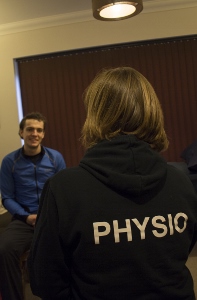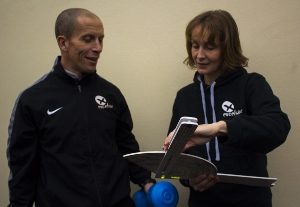13 lessons from Musculo skeletal screenings
The purpose of the screenings is to gauge an athlete’s readiness to train
 Having conducted over 80 musculo skeletal screenings with athletes from a huge variety of sports in the last year with a physiotherapist it is time to offer some reflections.
Having conducted over 80 musculo skeletal screenings with athletes from a huge variety of sports in the last year with a physiotherapist it is time to offer some reflections.
Establishing a rapport is key for the screening to go well, and I would say that in all but 2 of them, we have managed between us to do that.
We have adapted our feedback over time so that we give the athletes something simple to do at home without specialist equipment. It usually involves working on sitting and standing posture and practising some form of controlled movement such as squats, press ups or warm up.
The thing about doing a comprehensive screening is that you realise not only how different every person is, but also how similar they all are.Although every athlete is an individual and every sport is different, there are many similar traits. A few that come up regularly are:
- Poor posture from sitting at a computer or in the classroom lazily.
- Lop sided shoulders from the dominant arm sports.
- Inability of female athletes to sit down on a chair- compared to falling down.
- Low back pain in athletes who have gone through a recent growth spurt and are overspecialising in one sport.
- The early risers and multi- taskers have brilliant organisational skills and get things done.
- The University students with 3 hours of lectures a week “don’t have enough time” to eat breakfast, bring a water bottle, do 10 mins of body management exercises a day.
What is refreshing is that with over 40 years of combined experience, myself and the physiotherapists always manage to learn something new from each athlete. It is hard work, but very rewarding.
13 lessons learnt so far:
- Establishing rapport is essential.
- Certain phrases set off alarm bells in our minds “core stability” and “power cleans” are worrying from athletes who can not stand up straight or who have back injuries.
- Never assume that because a 15 year old boy is a national champion at sport x that he can do an unloaded squat, let alone weight training.
- Doing the plank 3 times a week has yet to show that the athlete can move fast and with balance in their sport.
- Simple messages are effective- then repeat them again and again.
- Flexibility of all young athletes is horrific.
- Most young athletes are keen and willing to learn, but self discipline to apply the lessons comes with maturity- some have it, some don’t.
- There is a reason why athletes who keep getting injured- either overtraining, or lack of planning from Coach\Athlete\parent.
- Most athletes are unable to plan their training for the next week- let alone month or year.
- Every athlete is different, but there are a lot of similarities also.
- What they do in daily activities such as school and home has a big impact on their body.
- We learn something new at every screening.
- Mum or Dad usually knows best with young athletes- but the teenager often ignores the parent!
If you would like to know the detail behind the screening process read this: what we currently do with athlete assessments.

